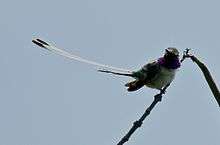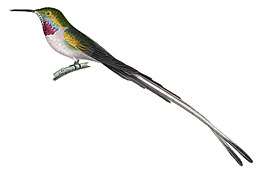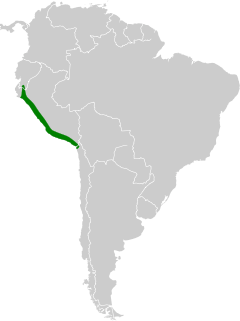Peruvian sheartail
The Peruvian sheartail (Thaumastura cora) is a hummingbird in the family Trochilidae. The species was first described by René Lesson and Prosper Garnot in 1827.
| Peruvian sheartail | |
|---|---|
| Museum specimen | |
| Scientific classification | |
| Kingdom: | Animalia |
| Phylum: | Chordata |
| Class: | Aves |
| Order: | Apodiformes |
| Family: | Trochilidae |
| Genus: | Thaumastura Bonaparte, 1850 |
| Species: | T. cora |
| Binomial name | |
| Thaumastura cora | |
Distribution
This species can be found in Peru west of the Andes and has been recorded in Ecuador. It has spread into northernmost Chile in recent decades.[2]
Habitat

Its natural habitats are lower slopes and semi-arid coastal zone of Andes, at an elevation up to 2,400 metres (7,900 ft) above sea level, subtropical or tropical dry shrubland, subtropical or tropical moist shrubland, subtropical or tropical high-altitude shrubland, and heavily degraded former forest.[2][3]
Description

Thaumastura cora can reach a length of about 13 to 15 cm (5.1 to 5.9 in) in males (tail 7 cm), of about 7 to 7.5 cm (2.8 to 3.0 in) in females. These tiny hummingbirds have a greatly elongated tail streamers and a short and straight black bill. The basic color of the plumage is iridescent green, with a white or light gray belly and an iridescent rosy purple to turquoise throat.[2][4]
The weight of this species is reportedly 2 to 2.5 g (0.071 to 0.088 oz), with an average mass of approximately 2.2 g (0.078 oz), which makes it one of the lightest birds alive. It seems to be the lightest known birds species found in South America,some 11.5 thousand times lighter than the greater rhea, the heaviest extant South American bird. Although other extremely diminutive South American hummingbirds, i.e. woodstars from the genera Myrmia and Chaetocercus based upon their tiny total lengths, may rival the Peruvian sheartail in lightness but have no published weights.[3][5][6]

Biology
These hummingbirds feed on nectar of flowering cacti, shrubs and trees (Russelia, Melocactus, Cordia and Malvaceae species).[2]
Bibliography
- del Hoyo, J., Collar, N.J., Christie, D.A., Elliott, A. and Fishpool, L.D.C. 2014. HBW and BirdLife International Illustrated Checklist of the Birds of the World. Lynx Edicions BirdLife International.
- James A. Jobling: A Dictionary of Scientific Bird Names. Oxford University Press, Oxford 1991, ISBN 978-0-19-854634-4.
- Jon Fjeldså, Niels Krabbe: Birds of the High Andes: A Manual to the Birds of the Temperate Zone of the Andes and Patagonia, South America. Apollo Books, Stenstrup 1990, ISBN 87-88757-16-1.
- René Primevère Lesson, Prosper Garnot: Voyage autour du monde exécuté par Ordre du Roi, sur la Corvette de Sa Majesté, La Coquille pendant les années 1822, 1823, 1824 et 1825. Bd. 1, Nr. 1. Arthus Bertrand, Paris 1827.
- René Primevère Lesson, Prosper Garnot: Voyage autour du monde exécuté par Ordre du Roi, sur la Corvette de Sa Majesté, La Coquille pendant les années 1822, 1823, 1824 et 1825. Bd. 1, Nr. 2. Arthus Bertrand, Paris 1830.
- Robert Sterling Ridgely, Paul J. Greenfield: Birds of Ecuador Field Guide: Status, Distribution, and Taxonomy. Bd. 1. Princeton University Press, Princeton 2001, ISBN 978-0-8014-8720-0.
- Robert Sterling Ridgely, Paul J. Greenfield: Birds of Ecuador Field Guide: Field Guide. Bd. 2. Princeton University Press, Princeton 2001, ISBN 978-0-8014-8721-7.
- Thomas Scott Schulenberg, Douglas Forrester Stotz, Daniel Franklin Lane, John Patton O'Neill, Theodore Albert Parker III: Birds of Peru. Princeton University Press, Princeton, New Jersey 2007, ISBN 978-0-7136-8673-9.
References
- BirdLife International (2012). "Thaumastura cora". IUCN Red List of Threatened Species. 2012. Retrieved 26 November 2013.CS1 maint: ref=harv (link)
- Handbook of the birds of the world
- Schulenberg, T.S.; Stotz, D.F.; Lane, D.F.; O'Neill, J.P.; Parker, T.A.; Egg, A.B. (2010). Birds of Peru: Revised and Updated Edition. Princeton University Press. p. 250. ISBN 9781400834495. Retrieved 13 April 2015.
- Clark, Christopher J. (2013). "Peruvian Sheartail Thaumastura cora". Neotropical Birds. Cornell Lab of Ornithology. Retrieved February 6, 2020.
- Schuchmann, K.L. & Boesman, P. (2016). Peruvian Sheartail (Thaumastura cora). In: del Hoyo, J., Elliott, A., Sargatal, J., Christie, D.A. & de Juana, E. (eds.). Handbook of the Birds of the World Alive. Lynx Edicions, Barcelona.
- CRC Handbook of Avian Body Masses, 2nd Edition by John B. Dunning Jr. (Editor). CRC Press (2008), ISBN 978-1-4200-6444-5.
